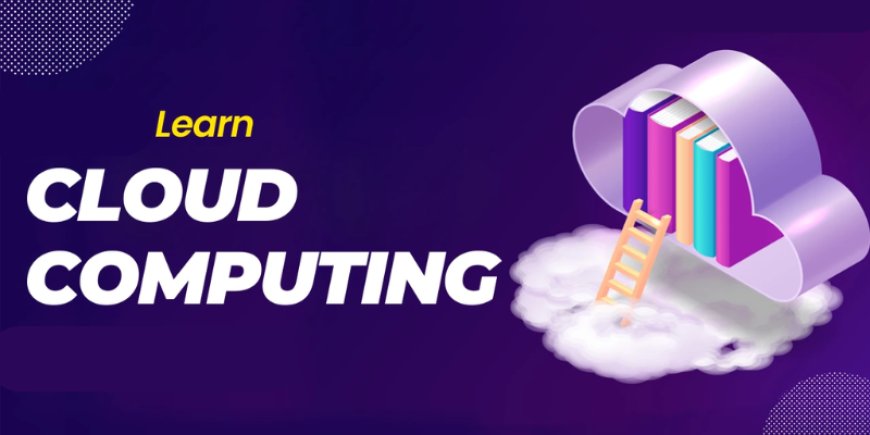Why Every Developer Should Learn Cloud Computing?
Cloud computing empowers developers with scalable resources, faster deployment, and global accessibility essential skills in modern software development.

The tech landscape has changed drastically in recent years, with cloud computing emerging as one of the most transformative innovations. From startups to Fortune 500 companies, businesses are increasingly turning to the cloud to host applications, store data, and deliver services at scale. For developers, this shift is not just a trend but a necessity to adapt to. Learning cloud computing is no longer optional its a critical skill that opens doors to modern software development, high-paying job opportunities, and innovative project building.
Cloud computing isnt just another technical skill; its now a foundational element in software architecture, project scalability, automation, and DevOps integration. For aspiring professionals, this is also a strong reason to choose a top-rated Training Institute in Chennai that focuses on cloud computing fundamentals and real-world project implementation.
The Rise of Cloud-Based Development
In traditional development environments, teams worked with limited computing resources and faced challenges in managing infrastructure. Today, cloud platforms like Amazon Web Services (AWS), Microsoft Azure, and Google Cloud Platform (GCP) offer developers access to virtually unlimited resources on demand.
Cloud software development enables:
-
Automatic server provisioning
-
Real-time scalability
-
Built-in security tools
-
Integration with CI/CD pipelines
What makes this shift even more exciting is the agility it brings to the development lifecycle. Developers can deploy, test, and scale applications faster than ever. This cloud-centric approach is especially vital for projects that demand high availability and performance.
If you're interested in multi-provider solutions, dont miss our blog on The Complexities of Multi-Cloud Integration, which explores how to manage workloads across AWS, Azure, and GCP effectively.
Scalability and Flexibility
One of the biggest advantages of cloud computing is scalability. With traditional servers, scaling meant purchasing more hardware or configuring load balancers manually. In the cloud, horizontal and vertical scaling can be automated.
As a developer, this means your applications can handle increased user demand without needing to rewrite core components. For example, an e-commerce site experiencing a spike in traffic during a holiday sale can easily scale its infrastructure to accommodate thousands of simultaneous users, all without manual intervention.
The flexibility to scale resources up or down based on usage also means developers can test and experiment freely. You can spin up a virtual machine or a Kubernetes cluster for a few hours, test your code, and shut it down, paying only for what you use.
Enhanced Collaboration and DevOps Integration
Cloud platforms are built for collaboration. With services like GitHub Actions, AWS CodePipeline, or Azure DevOps, developers can work together seamlessly, automate testing, and deploy code collaboratively. The cloud breaks down silos between development, testing, and operations, making DevOps practices smoother.
Features such as version control integration, remote code repositories, automated build tools, and monitoring dashboards enhance visibility and efficiency across development teams. Developers can push changes, trigger builds, run automated tests, and deploy to staging or production in a few minutes all through cloud services.
Mastering cloud computing equips developers with essential DevOps skills, including working with containers like Docker, managing orchestration through Kubernetes, and setting up CI/CD pipelines for streamlined deployments. To support this learning path, several Cloud Computing Courses in Chennai offer practical modules that combine cloud infrastructure management with real-world DevOps implementation, making them ideal for both beginners and working professionals.
Cost-Efficiency and Pay-As-You-Go Model
Cloud computing follows a pay-as-you-go pricing model, which means developers can use enterprise-level infrastructure without incurring huge upfront costs. For independent developers and startups, this democratizes access to powerful tools and computing power.
Need to train a machine learning model using a GPU? You dont need to buy expensive hardware rent a GPU instance on AWS for a few hours. Want to host a serverless web app? Use AWS Lambda or Google Cloud Functions and only pay when your code is executed.
This cost-efficient model allows developers to experiment, prototype, and build products without worrying about hardware constraints or financial risk.
Security and Compliance
Security is a top concern in software development. Cloud providers invest heavily in cybersecurity measures including data encryption, identity and access management (IAM), and automated security monitoring.
For developers, cloud computing offers robust security tools and compliance features out-of-the-box. You can encrypt your databases, create firewall rules, set up user roles and policies, and monitor real-time threats all without writing complex security code.
Learning how to implement secure coding practices in the cloud ensures your applications are not only functional but also protected against threats. This is especially crucial in domains such as artificial intelligence, where secure data handling is paramount. Many advanced Machine Learning Training in Chennai programs include modules on cloud-based security, ensuring that developers and data scientists are well-versed in building intelligent systems that are also robust against vulnerabilities.
Expanding Career Opportunities
The demand for cloud-savvy developers is skyrocketing. According to job market trends, roles such as Cloud Developer, Cloud Engineer, DevOps Engineer, and Site Reliability Engineer (SRE) are among the most in-demand tech jobs today.
Certifications like AWS Certified Developer, Google Associate Cloud Engineer, or Microsoft Certified: Azure Developer Associate can significantly boost your resume and earning potential. As more companies migrate to the cloud, those who understand cloud architecture, microservices, APIs, and serverless development will stand out in the job market.
Cloud-Native Technologies and Future Trends
Cloud computing is also the foundation for cutting-edge technologies like AI/ML, IoT, and edge computing. Developers working on smart applications, predictive analytics, and real-time systems often rely on cloud infrastructure to support data processing and scalability.
Cloud-native development also embraces microservices architecture, containerization, and serverless computing. By learning these modern approaches, developers prepare themselves not just for todays challenges but for future-proof careers in tech. As data-driven applications become increasingly prevalent, many teams are now seeking to integrate data science into cloud platforms, enabling the seamless deployment of analytics and machine learning models within scalable, cloud-native environments.
Cloud computing is revolutionizing how software is developed, deployed, and maintained. For developers, mastering cloud computing is more than a technical upgrade its a strategic career move. It equips you with the tools to build scalable, secure, and innovative applications while enhancing your productivity and collaboration with teams.
Whether you're an aspiring developer, a seasoned engineer, or a tech enthusiast, learning cloud computing opens a world of opportunities. In a digital-first world where speed, security, and scale matter, cloud skills are your passport to success.






































